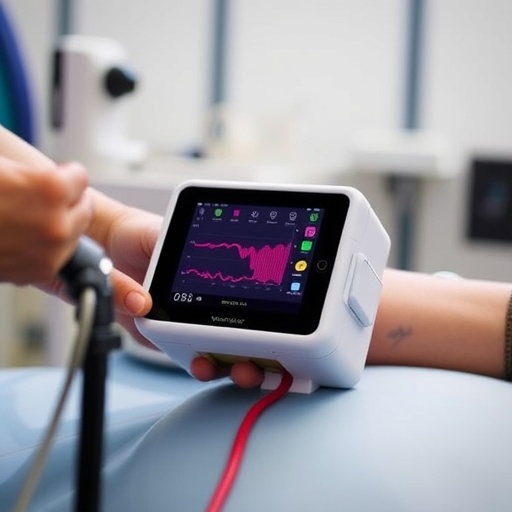In recent years, the landscape of cardiovascular medicine has been dramatically transformed through the integration of advanced engineering principles with clinical practices. A prominent advancement in this domain is the development of optimized blood pumps for ventricular assist devices (VADs), catering to patients suffering from severe heart failure. The intricate designs and innovative technologies utilized in these devices have piqued the interest of researchers and clinicians alike. A study conducted by Yıldırım, Uçak, Madayen, and colleagues has explored the optimization of blood pumps, focusing on enhancing their functional efficiency and patient compatibility.
Ventricular assist devices serve as crucial mechanical circulatory support systems, intended to aid the heart in pumping blood throughout the body. Patients who experience chronic heart failure often have weakened cardiac function, rendering their hearts incapable of sustaining effective circulation on their own. VADs have emerged as lifesaving interventions, providing necessary support to these patients while they await heart transplants or as a long-term solution.
The need for optimization in blood pump design is underscored by the challenges associated with conventional VADs. Often, these devices exhibit limitations in biocompatibility, durability, and overall efficiency. As a result, the development of a new generation of blood pumps calls for a comprehensive understanding of both engineering principles and biological interactions. This is where the research by Yıldırım and colleagues becomes significant, shedding light on how a system-level approach can lead to enhanced device performance.
The researchers employed state-of-the-art computational models to analyze the flow dynamics within these blood pumps. By simulating various scenarios, they could identify optimal design parameters that would minimize hemolysis and other adverse effects caused by shear stress on blood cells. These parameters encompassed geometric modifications of the pump impeller and casing, as even minor alterations can result in substantial changes in flow patterns and, subsequently, patient outcomes.
One of the critical breakthroughs in this study was the emphasis on customization. The researchers argue that patient-specific blood pump designs can significantly enhance compatibility and performance. Leveraging techniques such as three-dimensional printing, they are able to create pumps that not only match anatomical requirements of individual patients but also take into account their unique hemodynamic profiles. This personalized approach opens avenues for tailored treatments that could ultimately enhance quality of life for heart failure patients.
Moreover, the research emphasizes the role of material science in the development of VADs. The choice of materials directly influences not just the longevity of the device but also its interaction with bloodstream. Biocompatible materials can reduce thrombosis and inflammation, improving patient outcomes. Yıldırım and colleagues meticulously evaluated different materials through rigorous tests and analyses to determine the best combinations for specific components of the pump.
A noteworthy aspect of this study is the integration of artificial intelligence (AI) in the optimization process. By employing machine learning algorithms, the team was able to predict performance outcomes based on design tweaks, expediting the development phase beyond traditional trial-and-error methods. This approach allows for a more focused and efficient design process, which is critical in the high-stakes field of medical device manufacturing.
The implications of optimized blood pump designs extend beyond immediate patient care; they hold the potential to revolutionize treatment protocols for heart failure worldwide. The improvements in device reliability and efficiency could lead to wider acceptance and utilization of VADs in clinical settings, ultimately saving lives and reducing healthcare costs associated with chronic cardiac care.
For clinicians, understanding the nuances of these enhanced VADs is crucial. With new technology comes an obligation for medical professionals to stay informed about device capabilities and limitations. Continuous education and training in the latest innovations will empower healthcare providers to make informed decisions regarding patient management, leading to improved outcomes.
The study culminates in a clarion call for further research in this exciting field. The combination of engineering expertise and clinical insights is essential to push the boundaries of what’s possible in cardiac care. Yıldırım et al. suggest that collaborative efforts among engineers, biologists, and healthcare practitioners will foster an environment conducive to groundbreaking innovations, ensuring that patients receive the most advanced, effective treatments available.
As researchers continue to break new ground in the optimization of VADs, the future looks promising for patients battling heart failure. The possibilities presented by enhanced blood pumps are but a glimpse into the evolving intersection of technology and medicine. As we look to the future, questions about how these advancements will alter the prognosis for heart failure patients remain a focal point for advocates of innovation and improvement in healthcare systems.
This comprehensive study not only encapsulates the ongoing efforts to optimize blood pumps for VADs but also serves as a testament to the relentless pursuit of solutions that keep pace with the growing demands of patient care in an aging population. Advances in technology, such as those reported by Yıldırım and colleagues, signify a hopeful horizon, one where heart failure might transform from a daunting diagnosis to a manageable condition, ultimately redefining the quality of life for millions.
Subject of Research: Optimization of blood pumps in ventricular assist devices.
Article Title: Optimized FDA Blood Pump: A Case Study in System-Level Customized Ventricular Assist Device Designs.
Article References:
Yıldırım, C., Uçak, K., Madayen, A. et al. Optimized FDA Blood Pump: A Case Study in System-Level Customized Ventricular Assist Device Designs. Ann Biomed Eng (2025). https://doi.org/10.1007/s10439-025-03834-8
Image Credits: AI Generated
DOI:
Keywords: Ventricular Assist Device, Blood Pump Optimization, Heart Failure, Biocompatibility, Machine Learning, Personalized Medicine, Medical Device Engineering, Cardiovascular Treatment.




